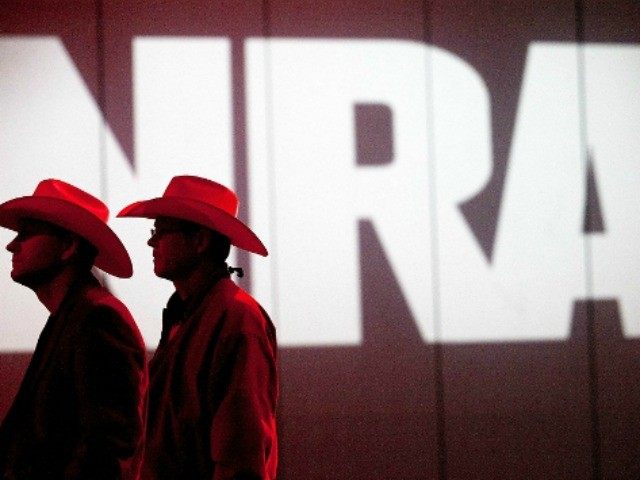Leaders of the National Rifle Association of America plan an unprecedented year-long election campaign to protect the Second Amendment and America’s gun-owning heritage, Executive Vice President Wayne LaPierre and his chief lobbyist Chris Cox informed the NRA board of directors at their Fall 2015 meeting last week in Virginia.
“We face a double-barreled threat like we never have before,” LaPierre began to the assembled directors on September 12, at the conclusion of several days of committee meetings. He discussed the anti-gun agenda of the candidates running for the Democratic nomination for president, as well as the challenging Senate map facing the NRA, given which seats are up next year.
LaPierre then pivoted to the third branch of government, noting the opportunity that the next president will have to shape the Supreme Court. An anti-gun president filling just a single vacancy could—depending on the current justice that the new one would replace—shift the balance of the Court. If that happens, LaPierre cautioned, the Second Amendment “as an individual right will be gone for the rest of our lifetimes.”
He then discussed the logistics of their election strategy to avoid that outcome, reminding the board, “NRA has a history of going in and tipping close races.” The NRA needs to raise over $50 million to execute the election strategy that it wants for 2016.
History suggests the NRA knows how to use its funds for maximum effect. In 1994, the NRA was a dominant force in flipping control of the U.S. Congress for the first time in 40 years, following Bill Clinton’s 1993 gun ban. In 2000, the NRA—led by LaPierre and then-President Charlton Heston—helped achieve the almost unheard-of feat of costing a presidential candidate his home state, when Al Gore lost Tennessee, as well as two other formerly Democratic pro-gun states, Arkansas and West Virginia. Similar victories followed in 2002 and 2004, and the NRA was a major moving force in the 2010 and 2014 national conservative victories.
Cox—executive director of the NRA’s Institute for Legislative Action—went through an inventory of Senate seats where the NRA would be active, including New Hampshire, Ohio, North Carolina, Florida, and Missouri. He also explained state-level issues that would require attention, such as the right to carry on college campuses in Florida and a proposed state constitutional amendment in Texas regarding hunting, fishing, and firearm-related rights.
But like LaPierre, Cox spent most of his time on the White House and the Supreme Court the next president would create. On the day the next president is inaugurated, there will be “three justices over 80, including two from the Heller majority,” Cox observed, a reference to the Supreme Court 2008 decision District of Columbia v. Heller.
This is significant because—although Cox shared polling data that 76 percent of Americans believe that they have a constitutional right to own the gun of their choice for self-defense and other lawful purposes—Heller held by a narrow 5-4 vote that the Second Amendment was an individual right enjoyed by American citizens.
The four dissenting justices wrote that the Second Amendment is not an individual right at all, and therefore that the government could completely ban all guns nationwide. Losing a single vote on the Supreme Court could make all the difference.
With that reality, Cox announced plans to seek $50-$75 million in contributions to sustain the NRA’s year-long effort for 2016, directing gun-rights supporters to their website and reaching new members through a massive nationwide outreach campaign.
This includes a series of targeted ads with the theme “Freedom’s Safest Place.” The ads feature personalities ranging from Oliver North talking about American service members losing their lives in wars that Barack Obama and Hillary Clinton have abandoned to “Lone Survivor” Navy Seal Marcus Luttrell calling out Obama and Clinton for not even calling Islamic terrorists by name to an elderly black American woman who marched with Martin Luther King, Jr., expressing her right to be safe in her own home.
“All the freedoms we have are interconnected and depend on each other,” LaPierre concluded, explaining these ads. Next year will tell whether the NRA makes its case to America’s 100 million gun owners.
Ken Klukowski is legal editor for Breitbart News. Follow him on Twitter @kenklukowski.

COMMENTS
Please let us know if you're having issues with commenting.